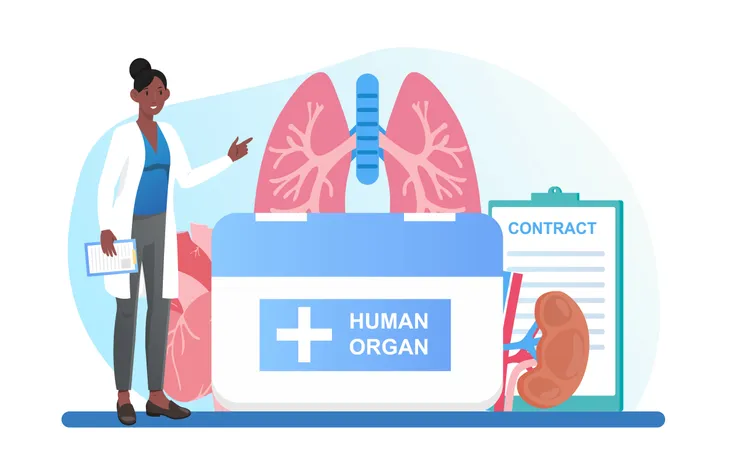Organ donation has historically been a medical procedure that only used organs from the deceased. Now with new medical technology living people can donate parts or entire organs. According to the American Transplant Foundation, 17 people die everyday waiting for an organ transplant. Allowing living organ donors has opened up a world of possibilities for the countless patients on donation waitlists.
Living organ donation has increased dramatically in recent years. With advancements in technology and information about the process, more people have stepped up to become living donors to help their loved ones and even strangers. The idea of donating one of your organs can be a scary thought. But when you are armed with the right information regarding the risks and benefits of being a living organ donor you can make an informed decision.
Benefit: Better Genetic Matching
When living organ donation is done between family members there is a higher chance of getting a close genetic match. There are several factors that transplant physicians look at to determine if a donor is a good match for the recipient. Blood type, crossmatching, and HLA are a few of the physiologic factors looked at. According to UC Davis, “If a recipient has strong antibodies against a donor’s HLA, the risk of rejection is high and a donor would be declined for that recipient.”
There are six antigens that have been identified as an important part of transplant matching. We receive three antigens from each parent. You have a one in four chance of being a complete match with one of your siblings. However, you don’t necessarily need to have a complete match to make an organ transplant successful. Talk to your transplant physician to learn more about the specific types of matching needed.
Benefit: Convenience for Donor and Recipient
One of the other benefits of being a living organ donor and recipient is that the transplant can occur at a time and place that works for both people. When someone dies and donates one or more of their organs there is a maximum distance that the organ can travel and a time frame that needs to be followed. With live organ donation, those restrictions can be avoided.
The convenience factor that live organ donation carries doesn’t completely remove all restrictions on place and time for organ donation. The recipient will likely have a timeline that needs to be followed and the donor may have to prep for donation by taking or stopping taking certain medications. Either way, allowing the donor and recipient the convenience of time and place can make the process feel less burdensome and reduce stress for both parties.
Benefit: Positive Life Experience
We’ve talked about the many benefits of being a living organ recipient but here is a benefit for the donor. When you donate an organ you are saving a life. This positive life experience can transform your outlook on life. It’s not often that we get the chance to actually save a life and by participating in organ donation you are doing just that.
Deciding to become a living organ donor shouldn’t be taken lightly. While there is a clear emotional benefit in providing life for someone else, donation is a lengthy process that involves many steps and screenings. But knowing that your time and effort will end with such a positive life experience can be the boost that many people need to get involved.
Benefit: Improving the Life of a Loved One
Another clear benefit of live organ donation is to increase the quality and quantity of life for a loved one. And as a live donor you will be able to witness their improved life. Live organ donation is typically done through directed donation. According to the Mayo Clinic, “This is the most common type of living-donor organ donation. In this type of living-donor organ donation, the donor directs the organ to a specific recipient for transplant.”
The most common type of live organ donation is kidney and liver. But there are several other types of live organ donation. When you donate a kidney you are helping your loved one get off dialysis, eliminate their renal failure, and have a greatly improved quality of life. The value you can provide someone you know and love is immeasurable with organ donation.
Benefit: Reduces Wait Time
A huge benefit for organ recipients from a living organ donor is that their wait time on the transplant list is greatly reduced. Patients who are on the transplant list are ranked not only by the time they spend on the list but also by the severity of their illness and the likelihood they will recover from transplant. Through live organ donation, a recipient’s time will be reduced and it allows them to receive an organ before they get too sick.
One of the difficult aspects of organ donation is when a patient becomes too sick to be able to safely receive a transplant. They still need the organ but the likelihood of them recovering is low. Therefore it’s determined that the patient should not, at that time, receive an organ. When a patient’s wait time is reduced, they may be able to avoid that situation.
Risk: Surgical Complications
As with any surgical procedure there are risks. The most common risks associated with organ donation are infection, bleeding, blood clots, and allergic reaction to the anesthetic. With advances in technology transplant risks with live organ donation are decreasing.
According to My Health Alberta, there is a 3 in 10,000 chance of death, which is the same as a cesarean section. Your transplant physician will talk to you about the risks associated with transplant. Each person will have a different risk level based on their health history and the type of donation they are planning to undergo.
 novak.elcic / Shutterstock
novak.elcic / ShutterstockRisk: Decreased Organ Function
Another very real risk of being a living organ donor is the risk of decreased organ function. However, like the risk of surgical complications, the risk is rather low. In fact, the risk of decreased organ function might be lower in organ donors than it is in general society. Organ donors are watched carefully by their healthcare team, so any changes in their remaining organ status will be found quickly and treated.
According to the American Transplant Foundation, “for kidney donors, there is only a 1% lifetime increase in the donor’s own risk of kidney failure. To put this into perspective, the general population has a 3% risk for kidney failure.” So while there is a risk to donors the risk is rather low.
Psychological Risks
One of the other risks of becoming a live organ donor that is often overlooked is the psychological risk. The Mayo Clinic tells us that, “donating an organ may also cause mental health issues, such as symptoms of anxiety and depression. The donated organ may fail in the recipient and cause feelings of regret, anger or resentment in the donor.”
While this risk cannot be completely avoided, it can be minimized by having a thorough discussion with the transplant team. Knowledge is power and understanding all the risks and benefits of donation can ease your anxieties. If the transplant does not work for the recipient, donors need to understand that it isn’t their fault. There are numerous risks to transplantation and many of them cannot be controlled.










